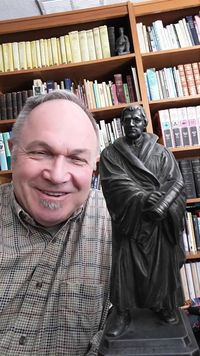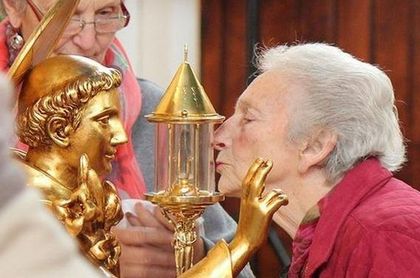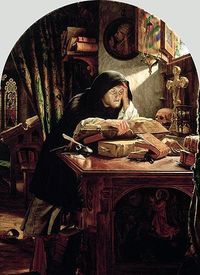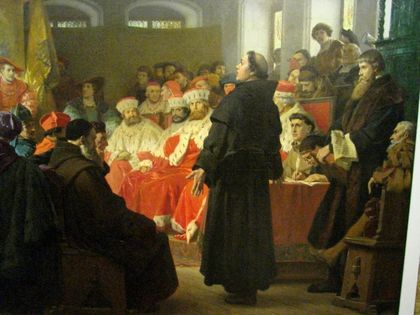Five hundred years later, the Solas give us as followers of Jesus our identity. When people ask, “What makes you an evangelical?”, we can respond with the five solas.

On October 31, 2017, we celebrated Reformation 500 — 500 years since the beginning of the Protestant Reformation. The Reformation is a fascinating story of God using faithful men and women of prayer and courage to launch a movement that saved the church and changed the world.
Your church is different today because of what happened 500 years ago. Your world is different today because of what happened 500 years ago.
I need to tell you right up front that Martin Luther has been my hero since I was a child. We had no TV (thankfully), but somehow my family had access to two huge 16mm reels of the 1953 classic movie on Martin Luther. (The very creative title of the movie was “Martin Luther.” Who could have guessed?)
I have seen that movie more times than any other movie in my life. Luther was my man, my hero. Even today I treasure an old statue of him given to me by dear friends in Switzerland.
Five hundred years later, it’s easy to forget what an amazing miracle of God the Reformation was. In 1517, Europe was a dark place —wicked and desperate. True followers of Jesus were hard to find.
The powerful and corrupt Roman Catholic church had been executing reformers for centuries. Masses of people were ignorant of the real message of the Bible about the free gift of salvation through faith in Jesus. In spite of all the beautiful cathedrals and a complex church organization, very few Europeans had even heard the Gospel.
All they knew about Christianity was an oppressive, corrupt, wealthy, and immoral Church that permitted no disagreement, a powerful political machine that dominated government, the economy, and the culture.
Here is a snapshot of the Roman Catholic Church in the 1500s:
- Many priests, bishops, archbishops, and popes lived in open and flagrant immorality.
- Church positions were sold to the highest bidder. Sometimes teenagers were appointed as bishops and cardinals simply because their family had lots of money to give to the church.
- Popes were selected not because of their piety, but because of their power and wealth.
- The church services were in Latin, a language hardly anyone understood.
- Many priests could barely read Latin themselves.
- It was forbidden to read the Bible or to interpret what it teaches.
- Translating the Bible was illegal.
- In order to help raise money, the church sold “indulgences,” which bought a person so many years out of purgatory.
- People could get bonus years out of purgatory by touching or seeing a relic — a supposedly “holy” object. Some relics were body parts, like a hair from Mary Magdalene’s head, Jesus’ baby teeth, a saint’s head or hand, blood from a saint, or milk from the Virgin Mary’s breast. Other relics were some physical object associated with a saint, like a nail or a piece of wood from the cross or fabric from Mary’s veil.

In other words, the medieval Catholic Church was a total mess when Europe needed the Gospel the most. Today in Europe the evangelical movement is weak; the official church is corrupt; and few people have heard the Gospel.
But remembering what God did for the Church and for Europe through the Protestant Reformation can build our faith and expand our vision for what God can do in our day across Europe and America.
So let’s ask and answer four questions:
- What happened in the Protestant Reformation 500 years ago?
- What were the key teachings of the Reformation?
- How did the Protestant Reformation change the world?
- What lessons can we learn for today?
What happened in the Protestant Reformation?
Here is a brief sketch of Martin Luther’s fascinating life. Luther was a man who was desperate to find peace with God, so he became a monk. But even in the sheltered environment of an Augustinian monastery in the middle of Germany, he lived in agonizing fear of God’s judgment.
He knew God was holy and that He would judge the smallest sin. So he knew he had reason to be afraid of God’s wrath. He had been taught by his church that God’s mercy is dependent on our actions, so he went to confession over and over until he exasperated his superior at the monastery.
He went to mass and administered mass with fear and literal trembling. He fasted and starved himself. He whipped his body, thinking that the pain would help him find God. But he found no peace, no rest. All of his efforts were futile.

Martin Luther was a scholar who had earned his doctoral degree in Bible. He became a university professor, teaching the Bible at a new university in the little town of Wittenberg, Germany. In the fall of 1515, he was lecturing on Romans. He spent hours intensely studying Romans 1:17, “the just shall live by faith.”
Finally, after weeks of poring over the Word and agonizing in his search for truth, the light of God’s free gift of salvation broke in upon him, and he scrawled two Latin words in the margin of his Bible: “sola fide,” Latin for “faith alone”.
He had found peace with God. He was born again! Luther wrote, “I felt myself to be reborn and to have gone through open doors into paradise. The whole of Scripture took on a new meaning”.
Over the next few months, Luther grew in his understanding of the Gospel and what radical Good News it was. At the same time, he became increasingly disturbed by the huge gap he saw between what Scripture taught about salvation and what his Church was teaching.
His university was purchasing more and more relics to help people get time out of purgatory. About this time, the pope launched a massive fundraising campaign to help build St. Peter’s Cathedral in Rome.
The pope’s representatives began selling special indulgences all across Europe. You could buy guaranteed forgiveness for any future sin you might commit. What a deal!
This was too much for Luther. So he sat down and wrote out 95 statements — 95 complaints —explaining what was wrong with what the Church was doing in this fundraising campaign — 95 points on why we must follow the Bible.
These 95 statements were called “theses,” because this was how a professor like Luther challenged someone to a debate.

The normal practice was to post a debate challenge in a public place, like the door of the church. So he nailed his 95 Theses to the door of the Castle Church in Wittenberg, Germany, on Oct 31, 1517, the eve of All Saints Day.
Nailing these protest statements on the door of the Church officially launched what we now know as the Protestant Reformation. Reformation means a re-forming or making-new of the Church.
Luther had no thoughts about leaving the Catholic Church. He loved his Church. He only wanted the Church to teach what was in the Bible.
Without his knowledge, printers secretly wrote down his 95 theses, and then to his surprise, thousands of printed copies spread all over Europe within weeks. They spread all the way to Rome, right to the palace of the pope.
Now the Church was angry. The pope was furious. The pope ordered him to change his mind. He was ordered to meet with church officials and repudiate what he had written. But he refused.
The more the Church insisted that Luther was wrong, the more strongly he insisted that the Bible should decide what is right and wrong, not the Church. He was digging furiously into Scripture, and in the process kept finding more and more ways his Church was not teaching what was in the Bible.
In April 1521, he was summoned to appear in court at a German town called Worms. This court was called a Diet, so it was called (in a phrase that sounds funny to non-German speakers) the Diet of Worms (yuck, suddenly I’m not hungry).
He was to appear before Charles V, the Emperor of the Holy Roman Empire, and Pope Leo X’s representatives to renounce his writings and to recant of his heresy.
The room was packed with nobles, bishops, and church officials of all ranks with Emperor Charles V on his throne. Luther was summoned to a table where all his books were displayed.
A famous scholar, Jan Eck, who had been appointed by the Emperor, approached Luther and asked him, “Do you or do you not repudiate your books and the errors they contain?”
Luther was sweating, but he quietly replied, in German, not in Latin, “Unless I am convinced by Scripture and plain reason…my conscience is captive to the Word of God. I cannot and I will not recant anything, for to go against conscience is neither right nor safe. God help me. Here I stand. I can do no other.”

Imagine the scene: one humble monk facing the two most powerful institutions in the world, staring at the threat of death and banishment from the Church, simply declaring, “Here I stand!”
This moment — this act of courage, this absolute commitment to the Word of God — changed the world, and the impact of the Protestant Reformation continues to this day.
There had been many reformers before Luther. Some, like Francis of Assisi, focused on the political and economic corruption of the Church, but Luther went well beyond this to show the theological corruption of the Church.
Luther showed that the Church was not basing its teachings on the Bible, but that it was teaching heresy instead. This was a different kind of protest.
What were the key teachings of the Reformation?
There were five core teachings of the Reformation that have become known as the Solas of the Reformation, after the Latin word sola meaning “alone.”
- Sola fide — faith alone. It is not through going to church, being good, nor through our efforts that we gain peace with God, but through faith alone. “For it is by grace you have been saved, through faith — and this is not from yourselves, it is the gift of God” Ephesians 2:8 (TNIV) Cf. Romans 3:22
- Sola gratia — grace alone. We can’t deserve or earn forgiveness of our sins. It is only through the free gift of God – grace. “In him we have redemption through his blood, the forgiveness of sins, in accordance with the riches of God’s grace that he lavished on us…” Ephesians 1:7-8 (TNIV) Cf. Eph 2:8; Romans 3:24
- Solus Christus — Christ alone. Praying to Mary or the saints, going to mass, or touching the relics of the Church cannot bring us peace with God. The Church cannot determine whether we are forgiven or not. “For there is one God, and there is one mediator between God and men, the man Christ Jesus.” 1 Timothy 2:5 (ESV)
- Sola Scriptura — the Bible alone. Truth is not based on Church tradition or man’s opinions, but on the Word of God. “All Scripture is God-breathed and is useful for teaching, rebuking, correcting and training in righteousness.” 2 Timothy 3:16 (TNIV)
- Sola Deo Gloria — to God alone be the glory. Because of all this, only God should get the glory — not the Church, nor any saint or priest. Ephesians 2:10
Five hundred years later, these biblical principles — these Solas — give us as followers of Jesus our identity. When people ask, “What makes you an evangelical?”, we can respond with the five solas.
I have friends who are Catholics who are born again. They have a personal relationship with Jesus. So they call themselves evangelical Catholics. This means they don’t accept the teaching of the Roman Catholic Church about salvation, but what the Bible teaches about the free gift of Christ through faith.
It’s popular nowadays, even in Christian circles, to say theology doesn’t really matter. But it was Reformation theology that brought massive changes across the social, political, moral, economic, religious, and cultural face of Europe. It was a major factor in shaping your church and the world you live in today.
Daryl McCarthy serves as Vice President of Academic Programs and Strategy with Forum of Christian Leaders (FOCL).

Las opiniones vertidas por nuestros colaboradores se realizan a nivel personal, pudiendo coincidir o no con la postura de la dirección de Protestante Digital.
Si quieres comentar o